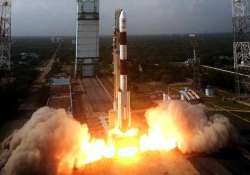Mars mission makes India top ranking space power: China report
Beijing: India's accomplishment in becoming the only Asian country to send a spacecraft to Mars has earned it a place in the top rankings of space-faring nations, a report by a Chinese research institution has

Beijing: India's accomplishment in becoming the only Asian country to send a spacecraft to Mars has earned it a place in the top rankings of space-faring nations, a report by a Chinese research institution has said.
The US, Europe, Russia, China, Japan and India are the leading powers in space, the Beijing Institute of Space Science and Technology Information, affiliated to the China Academy of Space Technology, said in a report.
India became the first Asian country to successfully send a probe to Mars in 2014, marking a breakthrough in its space capability, state-run Xinhua news agency quoted the report as saying.
The institute for the first time evaluated the space capabilities of 20 countries and regions across six aspects: strategy, product systems, infrastructure, industrial scale, innovation and international influence.
China's space capabilities are ranked the fourth in the world, and the gap between the leading powers is narrowing, the report said.
Last year saw a record 92 launches around the world, with 262 spacecraft put into orbit, it said.
The US' status as the only superpower in space is unshakable, but the gap between the US and other nations is narrowing, it said.
Europe and Russia are ranked as the next two great powers.
With its technological advantages and alliances with the US, Europe has also made a giant leap in its space capability.
Russia has curbed its decline, showing signs of recovery, thanks to its medium and long-term plans and reform of its space industry, the report said.
Pursuing an independent development path, China has made remarkable accomplishments in space technology, showing strong momentum and potential.
Helped by technological innovation, active international cooperation and an alliance with the US, Japan has also made rapid developments.
The report also mentions emerging countries in space represented by Canada and the South Korea, which closely follow China, Japan and India.
Space has become a "high frontier" as nations jostle for political, economic, military and scientific and technological advantages.
Driven by the needs of national security and economic interests, more countries are vying to flex their muscles in space, the report said.